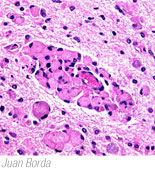 |
||||
Division of Regenerative Medicine The research component of the Division of Regenerative Medicine is active and involves collaborative and independent work in a number of areas. Studies focus on the development of gene and cell-based therapies for diseases of the central nervous and pulmonary systems.The research activities of the Division of Regenerative Medicine can be divided into investigations of Regenerative Medicine, stem cell biology and therapeutic applications and characterization of a nonhuman primate model of Krabbe’s disease.Vector-based Regenerative Medicine is a central focus of the Division of Regenerative Medicine. This work involves efforts to develop vector-based Regenerative Medicine strategies for Krabbe’s disease. The lab is currently developing a series of lentivirus vectors for the expression of GALC, the defective gene in Krabbe’s disease, both in vitro and in vivo. Our group has also established collaborations with two investigators from the University of Pennsylvania. We are presently investigating the biodistribution and transduction patterns for novel adeno-associated virus (AAV) serotypes and serotypes of lentivirus vectors. The stem cell program is presently focused on three sources of adult stem cells; mesenchymal stem cells (MSCs) from bone marrow and adipose tissue and neural stem cells directly from the brain. In the coming year, we will be collaborating with the Oregon NPRC by obtaining rhesus embryonic stem cells and doing direct comparisons between these and adult stem cells in the CNS. With our connection to the Krabbe’s Colony, we have begun to focus both of these research areas toward therapy for Krabbe’s disease. The Division of Regenerative Medicine is investigating the application of stem cells for pulmonary diseases in collaboration with investigators from the University of Vermont and the University of Pittsburgh. Lastly, the Division is beginning exciting research that assesses the therapeutic benefits provided by various stem cell populations in a nonhuman primate model of stroke. The Division of Regenerative Medicine is also responsible for coordinating studies in the only model of genetic disease in nonhuman primates, the Krabbe’s monkey. As such, the we are focused on the development and analysis of novel Regenerative Medicine strategies for lysosomal storage diseases. More importantly, the Krabbe’s rhesus monkeys are an invaluable national resource that will be available to investigators nationwide.
|
|
©2013 Tulane University |
